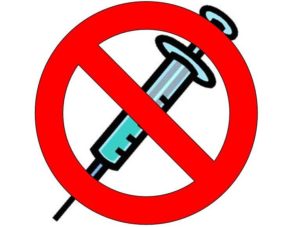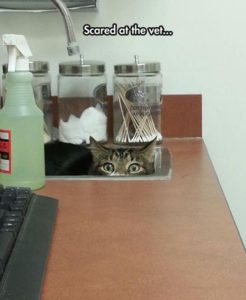The Ugly Truth About Annual Vaccinations For Pets
Does your cat really need annual vaccinations?
I overheard a conversation recently between a couple of people. One lady was telling the other that she needed to take her pet in for its annual vaccinations. It was all I could do to keep walking as I cringed, wanting desperately to share the truth with complete strangers. Why should they believe me? After all, I’m not their veterinarian. I know the topic of annual vaccinations for pets can be very controversial, but I truly feel in my heart that apart from learning to read and understand pet food labels, getting the facts about vaccines and immunology is one of the most important things you can do. It will help you decide, as your pet’s guardian, what truly is in your pet’s best interest.
If you’ve owned a cat for any length of time and made a visit to the vet at least once you’ve no doubt received the dreaded notice in the mail: it’s time to come in for Fluffy’s annual check-up and vaccinations! I remember those days. And like a good, doting cat parent I would obediently make the appointment. I didn’t even give it a second thought! The cats would feel puny, sleep all day and have no appetite for the next 24 hours. I knew they felt like crap and would give me that “why did you do this to me?” stare. I felt horribly guilty for being responsible for their misery.
Vaccine Ingredients Are Toxic
Why didn’t I ever question annual vaccinations? Have you? Why are they so necessary? Does my cat lose its immunity in one year? Many years ago when I learned about what vaccine manufacturers actually put in vaccines I was horrified and disgusted. They often include mercury (thimerosal), formaldehyde, detergents, GMO ingredients, aluminum phosphate, MSG, human albumin, and phenoxyethanol. ALL of these are TOXIC and have horrible consequences. Then it hit me: I understood WHY the cats always felt sick after getting vaccinations.
From that day on I swore I would never subject them to this form of torture ever again. Besides, my cats lived indoors, and the risk of them catching rabies or other diseases was virtually impossible. Their health was more important to me than following orders anymore, and I stopped drinking that Kool-Aid.
Lessons Are Often Learned The Hard Way
Unfortunately I learned my lesson a little too late. One of my cats at the time, Tosh, developed an injection site sarcoma on one of his hind legs that eventually was surgically removed. The cause? A vaccine. And vets have known about this potential side effect for years but never mentioned it to me until he was diagnosed with this condition.
A short time later the tumor started growing back, not only on the same spot on his leg, but also in his lungs. It ultimately led to his death. I was devastated knowing my ignorance played a role in his demise.
Dr. Karen Becker, DVM, has a great article about vaccines not being harmless. Respiratory disease is listed as a result of vaccine injury. Looking back it’s possibly what started my cat, Snowbear, down his path to feline bronchitis. He was vaccinated year after year for several years before I “woke up.”
Snowbear ultimately died from vaccinosis (vaccine injury) in November 2014 after receiving a round of vaccines required to board him. My hand was forced despite my beliefs and fears, and my worst nightmare came true. For this reason I refused to give Aylen a rabies vaccine when she was spayed. (You can read that blog here.)
Immune system confusion and vaccines
Dr. Becker isn’t the only vet who has taken a stand against unnecessary annual vaccines. Dr. Will Falconer, a homeopathic vet, and Dr. Richard Pitcairn, who holds a PhD in immunology, are convinced that annual vaccines actually create chronic illness in pets.
According to Dr. Falconer, “When your loved one’s life is threatened by his immune system attacking his own red blood cells or platelets, you’re seeing immune confusion. The immune system shouldn’t be attacking itself or overreacting to normal things. It should react strongly to a potentially dangerous virus however, but not fleas, foods or plants.”
Dr. Falconer blames immune confusion on vaccines. “Immune systems are put into a state of confusion by vaccines whose sole purpose is to hype that very system. Rather than be effectively immunized against real world viruses, vaccines result in chronic illness.”
Do humans get annual vaccinations?
So now we understand that vaccines are not only toxic but can have severe consequences. Let me ask you another question: do people get re-vaccinated every year? Of course not! But think about it: if we don’t re-vaccinated EVERY year, and our life span is decades longer than our cats, why do our cats need to be re-vaccinated EVERY year?
The answer is… they don’t! Most initial vaccines provide your cat with lifetime immunity, but your veterinarian will likely not tell you this. None of mine ever did, which makes me wonder…were they more interested in making money or towing the proverbial pharmaceutical party line? They clearly weren’t interested in preserving the integrity of my cats’ health.
Opt for titer tests, not annual vaccinations
It’s been suggested that getting a titer test every year to determine if your pet has lost immunity is one recourse to avoid revaccinating. However, a titer test, which measures the amount of antibody in the blood to a given disease agent, can be interpreted wrongly.
According to Dr. Falconer,
It only measures one fraction of the entire immune response: the antibodies produced against a particular organism. While their presence indicates protection, there is no reason for the immune system to keep producing antibodies against an invader forever, so, over time, these levels of antibody will wane. The fight is finished, there’s no more invader showing up, so there’s no need to keep a titer high.
What is not measured by the titer test is any part of the cell-mediated immunity, especially the memory cells. So, while antibody levels will wane over time, these long-lived memory cells lie quietly in the recesses of the immune system, awaiting further signals that the invader is back. It is these cells that are responsible for the duration of immunity that cannot be measured by a titer test.”
Annual vaccinations: Just Say No
You can also demand to opt-out! When I refused Aylen’s rabies vaccine I had to sign a form acknowledging that Aylen would be quarantined if she ever bit anyone in order to determine if she had rabies. And the quarantine would not be allowed to be done in my home but in a veterinary clinic. I happily signed it without worry; she can’t get what she’s never exposed to.
It’s also perfectly within your right as a pet parent to question your vet and not just nod your head and pay the bill. When the vet comments about updating vaccines during your visit you can politely say, “Thank you, but we’re going to skip that today.” Ultimately your cat’s health and life is in your hands–be its voice. If your vet doesn’t respect your views and concerns, as Dr. Falconer told me, “Find a vet who will be sympathetic to your beliefs,” and take your business elsewhere. Great advice!
Best advice for vaccinations
Dr. John Robb, DVM, is another vet who has tirelessly been working to get the rabies vaccine laws changed in order to prevent harming pets from over-vaccination. His work has shown that even if your pet’s titer is low it still demonstrates immunity; no need to re-vaccinate. Therefore, be smart next time you are presented with the suggestion that your cat is due for annual vaccinations. Here are some things to keep in mind:
- Vaccines should be given one at a time, not in combination with others
- Vaccines should be given at least 4 weeks apart
- Never vaccinate a kitten before 8 weeks of age
- Keep your vaccine records and know how many and how often your cat has received them
- Ask about and watch for adverse reactions–up to 30 days from the vaccination date
- If your cat has been diagnosed with a medical condition, illness, or disease do not vaccinate; vaccines are for healthy pets only
- If your cat has had an adverse reaction to a vaccine do not ever revaccinate
While I am not opposed to vaccines, I am opposed to giving vaccines that are not needed. As devoted cat parents we are committed to protecting our cats’ health, and sometimes this means we have to take a stand. Now that we know better we can do better, and our cats are worth it!
Here are a couple of great articles to learn more about vaccine ingredients and the vaccination waiver on the vaccine label:
http://www.naturalnews.com/035431_vaccine_ingredients_side_effects_MSG.html
http://vitalanimal.com/waiver/
Share in the comments below your experiences concerning annual vaccinations for your cat!
Updated 1/12/20




